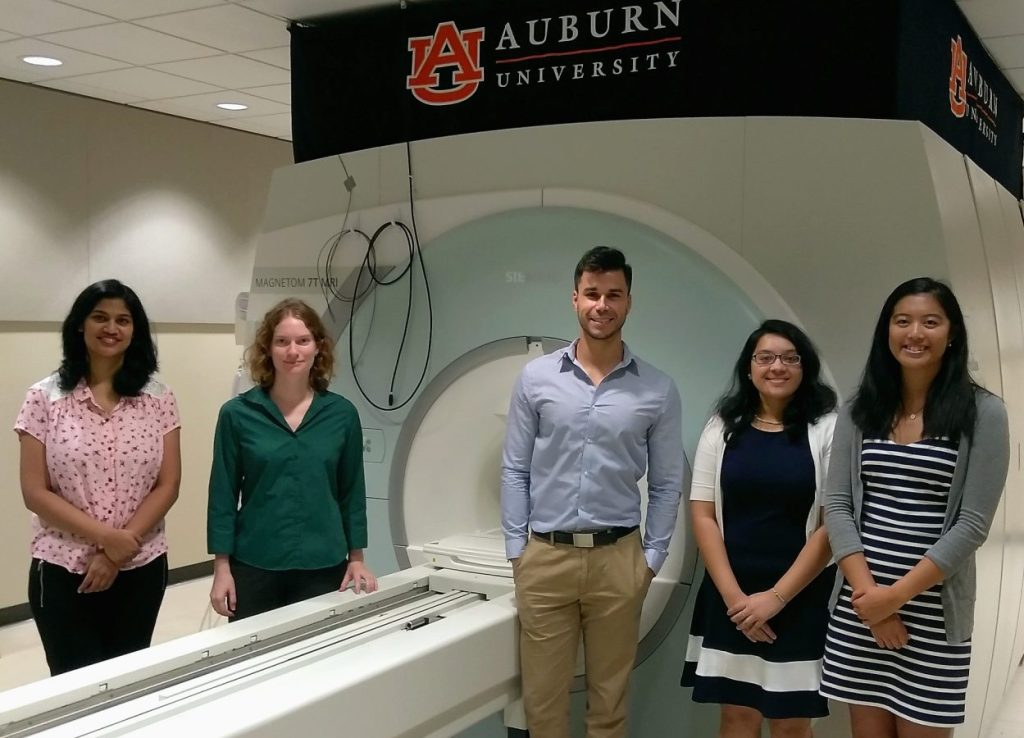Eligible students enrolled in a doctoral program at Auburn University who are engaged in neuroscience-related work are encouraged to apply to this program every year. As part of the application process, they submit a two-page letter description of their neuroscience-related work, their biosketch in NIH format, and a letter of support from the applicant’s primary faculty mentor.
Initial supplements provide research support of $5,000 and are granted to the most outstanding candidates. The supplement is competitively renewable with up to an additional $5,000 for a second term. Renewal requires demonstration of continued work in neurosciences research, active involvement by both advisor and student in CNS Initiative-related activities, and acceptable progress towards completing the doctorate degree.
Selected students may use the funds for research supplies that directly support the neurosciences research project, supplementing the graduate student’s stipend, or a combination of both.
The Auburn University CNS Initiative provides support for the Neurosciences Graduate Research Supplement Program through a Tier 2 grant received from the Auburn University Presidential Awards in Interdisciplinary Research (AU PAIR).
These are the outstanding recipients of this year award:

Annie Maguire, a third-year doctoral student in the Department of Anatomy, Physiology, & Pharmacology and Scott-Ritchey Research Center in the College of Veterinary Medicine, is advised by Dr. Douglas Martin. Maguire’s project investigates myelin pathology that is refractory to current gene therapy efforts for feline Sandhoff Disease, a fatal childhood neurodegenerative disease.
Project Title: Myelin Pathology in Feline Sandhoff Disease.
Julio A. Yanes, a fifth-year doctoral student in the Department of Psychology in the College of Liberal Arts, is advised by Dr. Jennifer L. Robinson. Yanes’s project examines effects of cannabis on human brain structure, function, and chemistry, specifically within the context of pain, using high-field magnetic resonance imaging (MRI) and spectroscopy (MRS) techniques.
Project title: 7T Functional MRI/MRS Assessment of Pain Processing in Cannabis Users.
Sindhu Ramesh, a third-year doctoral student in the Department of Drug Discovery and Development, Harrison School of Pharmacy, Auburn University, is advised by Dr. Timothy Moore. Ramesh’s project examines the effect of high cholesterols such as lysophosphatidic acid, a form of oxidized low-density lipoprotein (OxLDL) in the pathogenesis of Alzheimer’s disease and how hypolipidemic drugs such as statins attenuate it.
Project Title: Atorvastatin attenuates lysophosphatidic acid induced tau hyperphosphorylation by regulating the p38 MAPK pathway.
Priyanka Das Pinky, a 4th-year doctoral student in the Department of Drug Discovery and Development, in the Harrison School of Pharmacy, is advised by Dr. Vishnu Suppiramaniam. Pinky’s project utilizes a rodent model to examine the effects of cannabinoid exposure during pregnancy on the learning and memory of the offspring. Specifically, she is studying alterations in the glutamatergic system of the hippocampus and identifying mechanisms by which memory and synaptic plasticity are impaired following prenatal exposure.
Project Title: Elucidation of the molecular mechanism of learning and memory deficits in prenatal cannabinoid exposure: Identifying drug target.
Kara Chung, a second-year doctoral student in the Department of Human Development and Family Studies in the College of Human Sciences, is advised by Dr. David H. Chae. Chung’s project examines the impact of psychosocial and environment stressors that occur at the intersection of race and rurality on disparities in cognitive aging assessed by measures of axonal integrity, microvascular damage, functional connectivity, and verbal episodic memory.
Project Title: Neuroscience of psychosocial stress and cognitive aging among rural African Americans.
Last modified:
